Kia Ceed vs Peugeot 5008 - Differences and prices compared
Costs and Efficiency:
Looking at overall running costs, both models reveal some interesting differences in everyday economy.
Kia Ceed has a convincingly advantage in terms of price – it starts at 23500 £, while the Peugeot 5008 costs 37600 £. That’s a price difference of around 14117 £.
Fuel consumption also shows a difference: Peugeot 5008 manages with 2.70 L and is therefore convincingly more efficient than the Kia Ceed with 6 L. The difference is about 3.30 L per 100 km.
Engine and Performance:
Power, torque and acceleration are the classic benchmarks for car enthusiasts – and here, some clear differences start to show.
When it comes to engine power, the Peugeot 5008 has a convincingly edge – offering 325 HP compared to 140 HP. That’s roughly 185 HP more horsepower.
In acceleration from 0 to 100 km/h, the Peugeot 5008 is significantly quicker – completing the sprint in 6.50 s, while the Kia Ceed takes 9.50 s. That’s about 3 s faster.
In terms of top speed, the Peugeot 5008 performs to a small extent better – reaching 220 km/h, while the Kia Ceed tops out at 197 km/h. The difference is around 23 km/h.
There’s also a difference in torque: Peugeot 5008 pulls clearly stronger with 511 Nm compared to 253 Nm. That’s about 258 Nm difference.
Space and Everyday Use:
Beyond pure performance, interior space and usability matter most in daily life. This is where you see which car is more practical and versatile.
Seats: Peugeot 5008 offers noticeable more seating capacity – 7 vs 5.
In curb weight, Kia Ceed is distinct lighter – 1298 kg compared to 1700 kg. The difference is around 402 kg.
In terms of boot space, the Kia Ceed offers slightly more room – 395 L compared to 348 L. That’s a difference of about 47 L.
In maximum load capacity, the Peugeot 5008 performs convincingly better – up to 2232 L, which is about 941 L more than the Kia Ceed.
When it comes to payload, Peugeot 5008 evident takes the win – 640 kg compared to 490 kg. That’s a difference of about 150 kg.
Who comes out on top?
Overall, the Peugeot 5008 shows itself to be is largely superior and secures the title of DriveDuel Champion.
It convinces with the more balanced overall package and proves to be the more versatile choice for everyday use.
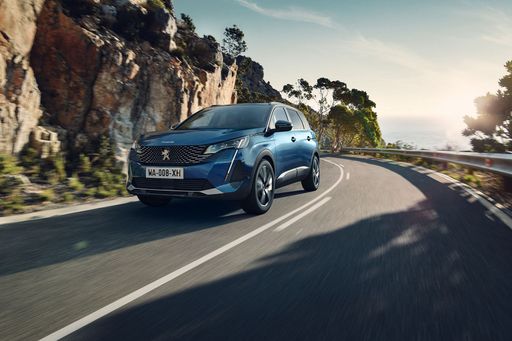 @ Peugeot / Stellantis Media
@ Peugeot / Stellantis Media
Peugeot 5008
Costs and Consumption
View detailed analysis
Engine and Performance
View detailed analysis
Dimensions and Body
View detailed analysis
Kia Ceed
The Kia Ceed is a sensible, stylish hatchback that gives buyers more than they'd expect for the money, blending practical space with crisp, modern looks. It drives with measured confidence and comes loaded with user-friendly kit, so you can enjoy daily life behind the wheel without breaking into a sweat.
details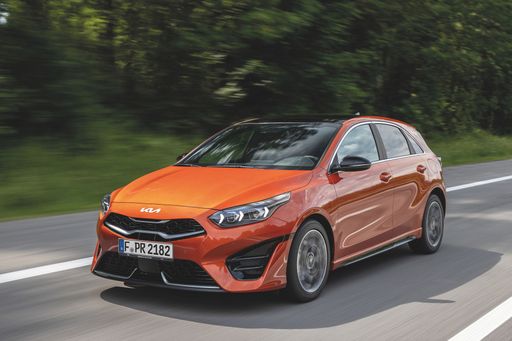 @ Kia Corporation
@ Kia Corporation
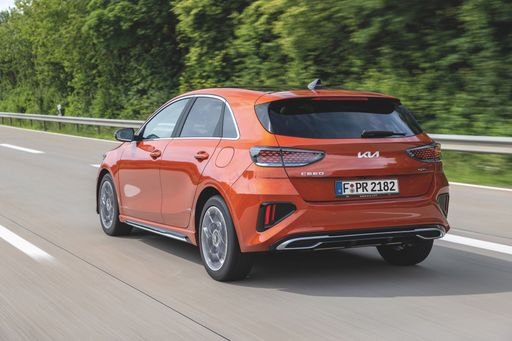 @ Kia Corporation
@ Kia Corporation
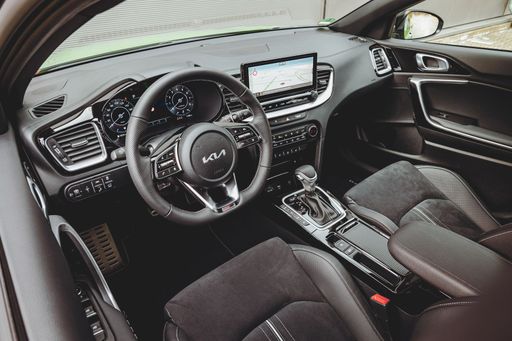 @ Kia Corporation
@ Kia Corporation
Peugeot 5008
The Peugeot 5008 blends Peugeot's sharp design with the space and versatility families actually need, wrapping clever packaging and a premium-feeling cabin in a crisp, SUV-like silhouette. It drives with more poise than you'd expect from a people carrier, serves up practical touches and flexible seating for everyday chaos, and still looks good when parked outside the school gates.
details @ Peugeot / Stellantis Media
@ Peugeot / Stellantis Media
 @ Peugeot / Stellantis Media
@ Peugeot / Stellantis Media
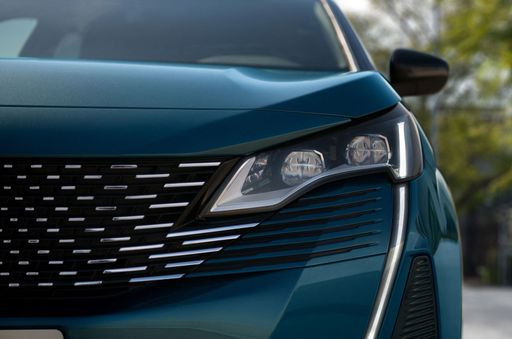 @ Peugeot / Stellantis Media
@ Peugeot / Stellantis Media
 @ Peugeot / Stellantis Media
@ Peugeot / Stellantis Media
 @ Kia Corporation
@ Kia Corporation
|
 @ Peugeot / Stellantis Media
@ Peugeot / Stellantis Media
|
|
|
|
Costs and Consumption |
|
|---|---|
|
Price
23500 - 26300 £
|
Price
37600 - 54200 £
|
|
Consumption L/100km
6 - 6.4 L
|
Consumption L/100km
2.7 - 5.6 L
|
|
Consumption kWh/100km
-
|
Consumption kWh/100km
17.8 - 18.6 kWh
|
|
Electric Range
-
|
Electric Range
78 - 669 km
|
|
Battery Capacity
-
|
Battery Capacity
0.4 - 96.9 kWh
|
|
co2
137 - 146 g/km
|
co2
0 - 127 g/km
|
|
Fuel tank capacity
50 L
|
Fuel tank capacity
55 L
|
Dimensions and Body |
|
|---|---|
|
Body Type
Hatchback
|
Body Type
SUV
|
|
Seats
5
|
Seats
7
|
|
Doors
5
|
Doors
5
|
|
Curb weight
1298 - 1372 kg
|
Curb weight
1700 - 2344 kg
|
|
Trunk capacity
357 - 395 L
|
Trunk capacity
294 - 348 L
|
|
Length
4315 mm
|
Length
4791 mm
|
|
Width
1800 mm
|
Width
1895 mm
|
|
Height
1447 mm
|
Height
1694 mm
|
|
Max trunk capacity
1253 - 1291 L
|
Max trunk capacity
2178 - 2232 L
|
|
Payload
478 - 490 kg
|
Payload
596 - 640 kg
|
Engine and Performance |
|
|---|---|
|
Engine Type
Petrol, Petrol MHEV
|
Engine Type
Electric, Petrol MHEV, Plugin Hybrid
|
|
Transmission
Manuel, Automatic
|
Transmission
Automatic
|
|
Transmission Detail
Manual Gearbox, Dual-Clutch Automatic
|
Transmission Detail
Reduction Gearbox, Dual-Clutch Automatic
|
|
Drive Type
Front-Wheel Drive
|
Drive Type
Front-Wheel Drive, All-Wheel Drive
|
|
Power HP
100 - 140 HP
|
Power HP
145 - 325 HP
|
|
Acceleration 0-100km/h
9.5 - 13.2 s
|
Acceleration 0-100km/h
6.5 - 10.2 s
|
|
Max Speed
178 - 197 km/h
|
Max Speed
170 - 220 km/h
|
|
Torque
172 - 253 Nm
|
Torque
230 - 511 Nm
|
|
Number of Cylinders
3 - 4
|
Number of Cylinders
3 - 4
|
|
Power kW
74 - 103 kW
|
Power kW
107 - 239 kW
|
|
Engine capacity
998 - 1482 cm3
|
Engine capacity
1199 - 1598 cm3
|
General |
|
|---|---|
|
Model Year
2024
|
Model Year
2024 - 2025
|
|
CO2 Efficiency Class
E
|
CO2 Efficiency Class
A, D, B
|
|
Brand
Kia
|
Brand
Peugeot
|
What drivetrain options does the Kia Ceed have?
The Kia Ceed is available as Front-Wheel Drive.
The prices and data displayed are estimates based on German list prices and may vary by country. This information is not legally binding.
